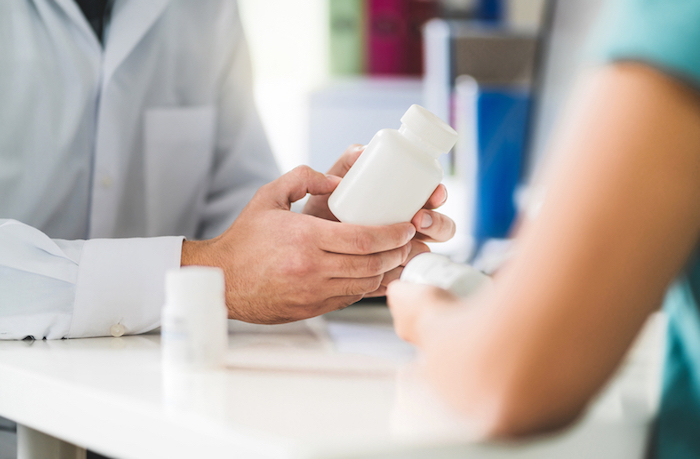- Calls to this hotline are currently being directed to Within Health or Eating Disorder Solutions
- Representatives are standing by 24/7 to help answer your questions
- All calls are confidential and HIPAA compliant
- There is no obligation or cost to call
- Eating Disorder Hope does not receive any commissions or fees dependent upon which provider you select
- Additional treatment providers are located on our directory or samhsa.gov
The Surprising Link Between Diet Pills and Eating Disorders

Contributor: Staff at McCallum Place
It can be tempting for someone to look for a quick fix when they are struggling with weight or body image concerns. And diet pill makers often tout exactly that, with promises to help people reach their weight loss goals much faster than other methods.
The hope contained in each diet pill convinces many people to try them, but most consumers don’t come out on the other end with a success story. That’s because taking diet pills often stems from an unhealthy way of thinking about body image and can be the start of a more serious concern, namely the development of an eating disorder.
From Diet Pills to Eating Disorder
More and more research points to a heightened risk for people developing an eating disorder when they take diet pills or use laxatives to control their weight.
Researchers from the University of Minnesota Public Health explored this very risk in just more than 1,000 adolescent girls. They found that those who used diet pills or laxatives to lose weight were much more likely to receive a first-time eating disorder diagnosis within five years of taking diet pills or laxatives than those who didn’t use these products [1].
A much larger study of 10,058 adolescent girls and women ages 14-36 supports these findings. The researchers discovered that when young women who had no history of eating disorders took diet pills or laxatives to lose weight, they increased their chances of developing an eating disorder within three years of using these products [2].
The researchers behind the second study say that this connection likely occurs for several reasons. Using these products can cause someone to change their eating patterns in unhealthy ways, and it can also disrupt a person’s digestive system. Taking diet pills and laxatives can also cause a person to hyperfocus on what their body looks like and what they’re eating, and this can bring up some painful feelings.
“Eating disorders have among the highest mortality rate of any mental health condition, so our finding that these products may be gateway drugs to a serious and life-threatening mental health condition is cause for alarm,” said Jordan Levinson, lead author of the second study [4].
A False Sense of Safety
Go to your local grocery store or scroll through your social media feeds and you’re bound to find products advertising weight loss or weight management. And celebrity endorsements, particularly on social media, give these products a false sense of authenticity, making them seem harmless.
But diet pills aren’t regulated or approved by the U.S. Food and Drug Administration, which means that they may not do what they promise or may contain harmful ingredients [4]. And using laxatives to keep from gaining weight might seem safe, but it doesn’t actually get rid of the foods a person just consumed. Laxatives only expel water, electrolytes, and minerals, so overuse can put a person at risk for dehydration, electrolyte and mineral imbalances, and damage to the colon and internal organs [6].
“Advertising for these products is common on social media, and the products are easily accessible at local pharmacies and groceries, which gives [people] the mistaken idea that they are safe to use,” said Levinson. “But this could not be further from the truth. These products are not medically recommended for healthy weight management and can even be dangerous.”
Getting Help
If you’re having trouble feeling positive about your body, there are healthier solutions than taking diet pills or laxatives.
Talking to a professional is a great place to start, whether that’s a primary care doctor, a dietitian, or a therapist. A healthcare professional can help you understand why you might be struggling with the way you feel about how your body looks, and they can also work with you on a plan for how you can feel more positive about your body.
When you work with a healthcare professional, they can also conduct an evaluation to make sure that you haven’t developed any other concerns, such as an eating disorder or another mental health condition like depression or anxiety. It is important to be screened for these conditions so that you can get early treatment.
It can be difficult to love your body when you’re bombarded by messages telling you that you can never be thin enough. But by reaching out to experts who understand what you’re going through, you can learn to have compassion and love for your body.
References
[1] Hazzard, V., Simone, M., Austin, B., Larson, N., & Neumark-Sztainer, D. (2021). Diet pill and laxative use for weight control predicts first-time receipt of an eating disorder diagnosis within the next 5 years among female adolescents and young adults. International Journal of Eating Disorders. 54(7), 1289-1294. https://doi.org/10.1002/eat.23531. [2] Roeder, A. (2019, Nov. 21). A gateway to eating disorders. The Harvard Gazette. Retrieved from https://news.harvard.edu/gazette/story/2019/11/diet-pills-linked-with-eating-disorder-diagnosis/. [3] University of Minnesota. (2021, May 19). Using diet pills and laxatives for weight control linked to future diagnosis of an eating disorder. Retrieved from https://twin-cities.umn.edu/news-events/using-diet-pills-and-laxatives-weight-control-linked-future-diagnosis-eating-disorder. [4] Crist, C. (2019, Nov. 29). Diet pills, laxatives may signal eating disorder risk in young women. Reuters. Retrieved from https://www.reuters.com/article/us-health-teens-eating-disorders/diet-pills-laxatives-may-signal-eating-disorder-risk-in-young-women-idUSKBN1Y327M. [5] Rosenbloom, C. (2019, Sept. 24). Instagram and Facebook ban ‘miracle’ diet posts, but there’s much more work to do. The Washington Post. Retrieved from https://www.washingtonpost.com/lifestyle/wellness/instagram-and-facebook-ban-miracle-diet-posts-but-theres-much-more-work-to-do/2019/09/23/0829a872-de26-11e9-b199-f638bf2c340f_story.html. [6] National Eating Disorders Association. (2022). Laxative abuse. Retrieved from https://www.nationaleatingdisorders.org/learn/general-information/laxative-abuse.About The Sponsor
McCallum Place is an eating disorder treatment center with locations in St. Louis, Missouri, and Kansas City, Kansas.
The opinions and views of our guest contributors are shared to provide a broad perspective on eating disorders. These are not necessarily the views of Eating Disorder Hope, but an effort to offer a discussion of various issues by different concerned individuals.
We at Eating Disorder Hope understand that eating disorders result from a combination of environmental and genetic factors. If you or a loved one are suffering from an eating disorder, please know that there is hope for you, and seek immediate professional help.
Published March 24, 2022 on EatingDisorderHope.com
Reviewed & Approved on March 12, 2024, by Baxter Ekern, MBA

